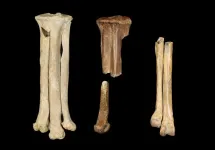(Press-News.org) Baylor University researcher Aaron Wright, Ph.D., has earned a $5.6 million National Institutes of Health (NIH) Director’s Transformative Research Award for a project that he and collaborators hope could lead to personalized – and revolutionary – treatments for gut microbiome diseases like Irritable Bowel Syndrome (IBS), Crohn’s, Ulcerative Colitis and more. Wright, a nationally recognized microbiome researcher and chemical biologist who serves as The Schofield Endowed Chair in Biomedical Science in Baylor’s Department of Biology, will partner on the project with colleagues from Weill Cornell Medicine in New York.
“The NIH Director’s Transformative Award is an exciting award that we’re grateful to receive,” Wright said. “We’ve proposed an idea that is out-of-the-box but has potential. If successful, it would be truly transformative. People’s gut microbiomes vary greatly, and much of this field is moving toward personalized therapies. Our long-term vision is to develop personalized fecal microbiota transplantation for microbiome diseases that identify and deliver select bacteria based on the individual.”
Wright will serve as co-principal investigator on the project with Randy Longman, M.D., Ph.D., director of the Jill Roberts Center for Inflammatory Bowel Disease and associate professor at Weill Cornell Medicine, and Chun-Jun Guo, Ph.D., assistant professor in the Jill Roberts Center and associate professor at Weill Cornell Medicine. They will partner on the award, which is designated by the NIH for innovative but inherently risky research endeavors that have the potential to overturn existing scientific paradigms or create new ones.
“The innovative research being done by Dr. Wright into the microbiome is garnering national recognition for Baylor University in an important and emerging area of medical sciences,” said Lee Nordt, Ph.D., dean of the College of Arts & Sciences. “The specific application of this project to human health has the potential to serve individuals with a number of gut diseases, and we look forward to seeing the impact of that work.”
New routes to treatment
The microbiome is the collection of microorganisms found throughout the body in areas such as the gastrointestinal (GI) tract, and Wright’s research focuses on the processes that take place within the gut. Wright and his team conduct research at the interface of chemistry and microbiology to observe gut health outcomes. Their approach is to synthesize and deploy activity probes to study inputs within the gut – ranging from environmental factors to diet, along with the mechanisms and processes within the gut – to uncover clues about the causes that lead to health outcomes.
Just as each person is different, their gut microbiomes are distinct based on diet and other factors. As such, “one-size-fits-all” approaches to treating IBS, Crohn’s or Ulcerative Colitis likewise vary greatly in efficacy due to the uniqueness of microorganisms in each person’s gut.
“If you sampled random people from around the world, such as Japan, Norway or Kenya, you’d find different population components and distributions within their gut based primarily on diet,” Wright said. “If you compare them all, you’d say, ‘their guts are wildly different.’ And while that’s true, the argument I make is that they are all capable of nearly the same functional skills, or what we call metabolic activities.”
Each person, Wright said, is capable of almost all the same metabolic processes, but there are disturbances to these processes that cause disease.
“Our approach is to measure not who the cells inside the gut are, but what they are doing. Much of this discipline has been dominated by the question of ‘who’s there?’ We’re using research at the chemistry-biology interface to try to answer the question, ‘Who’s there, and what are they doing?’” he said.
Personalized treatments
The answer to those questions, Wright and his collaborators hope, will enable the development of personalized treatments as an outcome of this project. Fecal microbiota transplantation has long been used in hospitals to treat individuals with infections, and that approach could be used to deposit needed bacteria tailored to the individual. However, these transplantations are not tailored to individual need but are rather an entire sample that may or may not meet an individual’s specific needs.
“Our interest is to look at a person with IBD or other diseases and see if we can identify specific aspects of the microbiome that are either missing or over-expressed. We’re working to develop the science to isolate specific bacteria that perform an activity we care about that could be restorative,” Wright said.
From there, researchers hope to develop personalized fecal microbiota transplantations that could be deposited anywhere a colonoscopy can reach.
“No longer would you be depositing an entire fecal sample,” Wright envisions, “but taking a select handful of bacterial that you could transplant. That’s again the long-term goal: to treat different intestinal issues through personalized therapeutics.”
The award will provide approximately $5.6 million in funding to the institutions over a five-year period.
ABOUT BAYLOR UNIVERSITY
Baylor University is a private Christian University and a nationally ranked Research 1 institution. The University provides a vibrant campus community for more than 20,000 students by blending interdisciplinary research with an international reputation for educational excellence and a faculty commitment to teaching and scholarship. Chartered in 1845 by the Republic of Texas through the efforts of Baptist pioneers, Baylor is the oldest continually operating University in Texas. Located in Waco, Baylor welcomes students from all 50 states and more than 100 countries to study a broad range of degrees among its 12 nationally recognized academic divisions.
END
Microbiome researcher awarded NIH Transformative Research Award to pursue personalized treatment for gut diseases
Aaron Wright, Ph.D., partners with colleagues at Weill Cornell Medicine on “out-of-the-box” $5.6 million NIH grant to target treatments for IBS, Crohn’s, Ulcerative Colitis and more
2024-10-09
ELSE PRESS RELEASES FROM THIS DATE:
Teresa Bowman, Ph.D., named Chair of Developmental & Molecular Biology at Albert Einstein College of Medicine
2024-10-09
October 9, 2024—(BRONX, NY)—Stem cell researcher Teresa Bowman, Ph.D., has been appointed chair of the department of developmental & molecular biology (DMB) at Albert Einstein College of Medicine after a comprehensive national search. Dr. Bowman will begin her new role on December 1, following the longtime leadership of Richard Stanley, Ph.D.
“Dr. Bowman has demonstrated her leadership abilities, commitment to mentorship, and dedication to the College of Medicine since she ...
Legal system fails to protect people from malicious copyright cases at the cost of sexual privacy, study warns
2024-10-09
Changes need to be made to the UK legal system to protect people from exploitative litigation designed to prey on vulnerabilities, a new study warns.
Reforms need to be made to protect adults from unfairness during copyright enforcement legal proceedings. This would also help to prevent children being exposed to adult pornography online.
The malicious litigation typically involves copyright holders or their agents of online pornographic works obtaining contact details of internet users via a court order to ...
Ancient climate analysis reveals unknown global processes
2024-10-09
According to highly cited conventional models, cooling and a major drop in sea levels about 34 million years ago should have led to widespread continental erosion and deposited gargantuan amounts of sandy material onto the ocean floor. This was, after all, one of the most drastic climate transitions on Earth since the demise of the dinosaurs.
Yet a new Stanford review of hundreds of studies going back decades contrastingly reports that across the margins of all seven continents, little to no sediment has ever been found dating back to this transition. The discovery of this globally extensive gap in the geologic record was published this week in Earth-Science Reviews.
“The ...
Gene therapy shows long-term benefit for patients with a rare pediatric brain disease
2024-10-09
Cerebral adrenoleukodystrophy (CALD) is a rare progressive, genetic brain disease that primarily presents in young boys, causing loss of neurological function and ultimately leading to early death. Researchers from Massachusetts General Hospital, a founding member of the Mass General Brigham healthcare system, Boston Children’s Hospital, and collaborators have shown that six years after treatment with the first gene therapy approved for CALD, 94 percent of patients have had no decline in neurological functioning, with over 80 percent remaining free of major disability. Findings, published in two articles in the New England Journal of Medicine, describe long-term outcomes ...
Do people with MS have an increased risk of cancer?
2024-10-09
MINNEAPOLIS – A new study has found some cancers to be slightly more frequent in people with multiple sclerosis (MS) than in people without MS. The study is published in the October 9, 2024, online issue of Neurology®, the medical journal of the American Academy of Neurology. Types of cancers found to have a small increased risk include bladder, brain and cervical cancers. The study does not prove that MS increases a person’s risk of cancer. It only shows an association.
With MS, the body’s immune system attacks myelin, the fatty, white substance that insulates and protects the nerves. MS is chronic and can be unpredictable and disabling.
“People ...
New research on octopus-inspired technology successfully maneuvers underwater objects
2024-10-09
Using mechanisms inspired by nature to create new technological innovations is a signature of one Virginia Tech research team. The group led by Associate Professor Michael Bartlett has created an octopus-inspired adhesive, inspired by the shape of octopus suckers, that can quickly grab and controllably release challenging underwater objects.
Having the ability to grab and release these underwater objects like heavy rocks, small shells, and soft beads, and other debris could be a powerful tool for underwater salvage and even rescue operations. Their findings have been published in Advanced Science.
This work was performed with undergraduate researchers Austin Via, Aldo Heredia, ...
Newly discovered Late Cretaceous birds may have carried heavy prey like extant raptors
2024-10-09
Newly discovered ancient birds from Late Cretaceous North America were hawk-sized and had powerful raptor-like feet, according to a study published October 9, 2024 in the open-access journal PLOS ONE by Alexander Clark of the University of Chicago, U.S. and colleagues.
The most diverse birds during the Cretaceous Period were a now-extinct group called enantiornithines, known from all over the world during this time. However, enantiornithines and other Mesozoic birds are mainly known from Lower Cretaceous deposits, with a relatively poor record ...
Bat species richness in San Diego, C.A. decreases as artificial lights, urbanization, and unconserved land increase, with Townsend's big-eared bat especially affected
2024-10-09
Bat species richness in San Diego, C.A. decreases as artificial lights, urbanization, and unconserved land increase, with Townsend's big-eared bat especially affected
###
Article URL: https://journals.plos.org/plosone/article?id=10.1371/journal.pone.0310812
Article Title: Quantification of threats to bats at localized spatial scales for conservation and management
Author Countries: U.S.A.
Funding: The United States Geological Survey Western Ecological Research Center and Ecosystems Mission Area provided funding and support, and the National ...
Satellite data shows massive bombs dropped in dangerous proximity to Gaza Strip hospitals in 2023
2024-10-09
Satellite data on the proximity of hundreds of M-84 bomb craters to hospitals in the Gaza Strip suggests that, as of November 2023, hospitals were not being given special protection from indiscriminate bombing, as mandated by international humanitarian law. That is one finding out of a new study published this week in PLOS Global Public Health by Dennis Kunichoff of Harvard University, and colleagues.
On October 7, 2023, Israel launched a major military campaign in the Gaza Strip in response to Hamas militant attacks in Israel. Among the munitions being used are United-States-provided Mark-84 (M-84) bombs, which are air-dropped explosive munitions that shoot more than 1000 pounds ...
Predatory birds from the same fossil formation as SUE the T. rex
2024-10-09
The Hell Creek Formation in what’s now the Dakotas, Montana, and Wyoming was once home to some of the world’s most beloved dinosaurs, like Triceratops and Tyrannosaurus rex (including SUE, one of the largest, most complete, and best-preserved T. rex specimens ever found). But these giant dinosaurs weren’t alone in their ecosystem, and in a paper in the journal PLOS ONE, scientists have described two new species of birds that lived alongside these dinosaurs 68 million years ago. The researchers ...
LAST 30 PRESS RELEASES:
Novel camel antimicrobial peptides show promise against drug-resistant bacteria
Scientists discover why we know when to stop scratching an itch
A hidden reason inner ear cells die – and what it means for preventing hearing loss
Researchers discover how tuberculosis bacteria use a “stealth” mechanism to evade the immune system
New microscopy technique lets scientists see cells in unprecedented detail and color
Sometimes less is more: Scientists rethink how to pack medicine into tiny delivery capsules
Scientists build low-cost microscope to study living cells in zero gravity
The Biophysical Journal names Denis V. Titov the 2025 Paper of the Year-Early Career Investigator awardee
Scientists show how your body senses cold—and why menthol feels cool
Scientists deliver new molecule for getting DNA into cells
Study reveals insights about brain regions linked to OCD, informing potential treatments
Does ocean saltiness influence El Niño?
2026 Young Investigators: ONR celebrates new talent tackling warfighter challenges
Genetics help explain who gets the ‘telltale tingle’ from music, art and literature
Many Americans misunderstand medical aid in dying laws
Researchers publish landmark infectious disease study in ‘Science’
New NSF award supports innovative role-playing game approach to strengthening research security in academia
Kumar named to ACMA Emerging Leaders Program for 2026
AI language models could transform aquatic environmental risk assessment
New isotope tools reveal hidden pathways reshaping the global nitrogen cycle
Study reveals how antibiotic structure controls removal from water using biochar
Why chronic pain lasts longer in women: Immune cells offer clues
Toxic exposure creates epigenetic disease risk over 20 generations
More time spent on social media linked to steroid use intentions among boys and men
New study suggests a “kick it while it’s down” approach to cancer treatment could improve cure rates
Milken Institute, Ann Theodore Foundation launch new grant to support clinical trial for potential sarcoidosis treatment
New strategies boost effectiveness of CAR-NK therapy against cancer
Study: Adolescent cannabis use linked to doubling risk of psychotic and bipolar disorders
Invisible harms: drug-related deaths spike after hurricanes and tropical storms
Adolescent cannabis use and risk of psychotic, bipolar, depressive, and anxiety disorders
[Press-News.org] Microbiome researcher awarded NIH Transformative Research Award to pursue personalized treatment for gut diseasesAaron Wright, Ph.D., partners with colleagues at Weill Cornell Medicine on “out-of-the-box” $5.6 million NIH grant to target treatments for IBS, Crohn’s, Ulcerative Colitis and more






